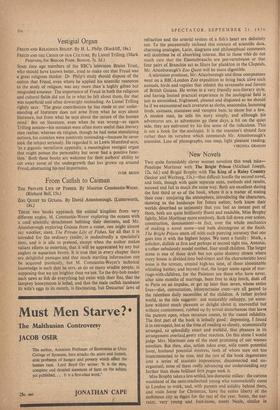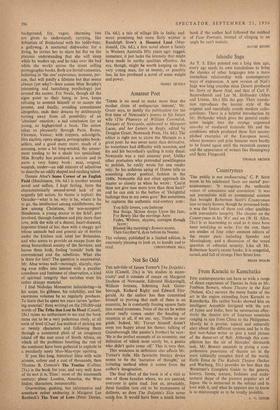New Novels
Two quite formidably clever women novelists this week take— Penelope Mortimer with The Bright Prison (Michael Joseph, 12s. 6d.) and Brigid Brophy with The King of a Rainy Country (Secker and Warburg, 15s.)—that difficult hurdle the second novel, and both, though with quite separate aims, methods and results, succeed and fail in much the same way. Both are excellent during the first third or so of the book, where it is a matter of stating their case: conjuring the atmosphere, introducing the characters, showing us the landscape for future action; both know their worlds described so intimately that you feel an instant part of them, both are quite brilliantly fluent and readable, Miss Brophy lightly, Miss. Mortimer more sombrely. Both fall down over action, construction, denouement—in fact, over the whole mechanics of making a novel move—and both disintegrate at the finish. The Bright Prison starts off with such piercing accuracy that one goes into it with the highest hopes. We meet a family : Mark, a solicitor, dullish at first and perhaps at second sight too, Antonia, a rather nebulously model mother, four small children. The larger scene is one of those drab but not quite slummy streets where every house is divided into bed-sitters and the characteristic local noise is the scream, around high-tea time, of those abominable whistling kettles; and beyond that, the larger scene again of mar- riage-with-children, for the Paintons are those who have never, after nine months of marriage, been free to skip lunch, dash off to Paris on an impulse, or get up later than seven, whose entire lives—diet, conversation, idiosyncrasies even—are all geared to the relentless daily necessities of the children. A rather joylesg world, as the title suggests: not noticeably unhappy, yet. some- how without much pleasure or delight about it, uneventful but without contentment, rubbed up by trivial disturbances that leave the parents open, when occasion comes, to the casual infidelity. The first part of the book is lethally good : depressing, I found it in retrospect, but at the time of reading so closely, economically arranged, so splendidly exact and truthful, that pleasure in its arrangement overlaid every other reaction. On this alone I would judge Mrs. Mortimer one of the most promising of our women
judge Mrs. Mortimer promising novelists. But then, alas, action takes over, wife meets potential lover, husband potential mistress, both of whom turn out too interconnected to be true, and the rest of the book degenerates into a series of staccato impressions, disconnected and un- organised, none of them really advancing our understanding any further than those brilliant first pages took it.
Miss Brophy takes a less settled, less domestic milieu : the curious wasteland of the semi-intellectual young who automatically come to London to work, and, with parents and solidity behind them, and visits home for Christmas, have the entire liberty of the enormous city as theirs for the rest of the year. Susan, the nar- rator, very young and foot-loose, meets Neale, similar in background, fey, vague, charming (we are given to understand), carrying, like Sebastian of Brideshead with his teddy-bear, a gollywog. A nocturnal dishwasher for a living, he invites her to share his flat on the platonic understanding that she will sleep while he washes up, and he take over the bed while she works across the street selling pornographic books. Both are fervid romantics, believing in 'the one' experience, moment, per- son, that will justify a lifetime but that seems always (yet why?—here comes Miss Brophy's interesting and tantalising psychology) just around the corner. For Neale, though all the signs point to their being in love, keeps refusing to commit himself or to accept the present, and finally, avoiding commitment altogether., ends their dreams by deliberately turning away from all possibility of an 'absolute' emotion: a sad conclusion for so young, so highspirited a book. The action takes us pleasantly through Paris, Rome, Florence, Venice; with trippers, schoolgirls, film starlets, opera singers, pornographic book- sellers, and a good many more; much of it amusing, some a bit long-winded, the amuse- ment tending to be a shade too specialised. Miss Brophy has produced a serious and in parts a very funny book: neat, original, waspish, tender—an odd mixture of adjectives to describe an oddly shaped and exciting talent.
Dannie Abse's Some Corner of an English Field (Hutchinson, 10s. 6d.) is another second novel add suffers, I kept feeling, from the characteristically second-novel lack of an urgently felt action. Its theme is topical: the Outsiderl-what is he, why is he, where is he to go, the intellectual among middlebrows, the Jew among Christians, the non-acceptor? Henderson, a young doctor in the RAF, gets involved, through fondness and pity more than love, with the wife of a decent, heart-diseased, impotent friend of his; then with a shaggy girl whose unmade bed and general air of beetles under the kitchen sink label her Bohemian, and who seems to provide an escape from the smug hierarchical society of the Services; and leaves them both, feeling 'outside' both the conventional and the rebellious. What else is there for him? The question is unanswered. Mr. Abse writes well—movingly, sharply, rais- ing even trifles into interest with a peculiar soundness and freshness of observation, a kind of spiritual integrity that enriches even his rather skimpy material.
I find Nicholas Monsarrat intimidating—in his scope, his glibness, his volubility, and the enormous volumes he so regularly produces. To learn that he spent ten years (seven 'gather- ing material,' three writing) on the 250,000-odd words of The Tribe that Lost Its Head (Cassell, 18s.) raises no enthusiasm in me and the book turns out to be a very pedestrian study, at all sorts of level (Cruel Sea method of picking ten or twenty characters and following them through a connected plot) of an imaginary island off the east coast of South Africa, on which all the problems besetting the rest of the continent have been gathered to explode in a peculiarly nasty Mau-Mau-type uprising.
If you like long, historical films with wide screens, colour and a cast of thousands, then Thomas B. Costain's The Tontine (Collins, 21s.) is the book for you; and very well done of its sort it is. Time: most of the nineteenth century; place: London, America, the West Indies; characters, innumerable.
Overwritten, gushing, but informative and somehow rather endearing is Margaret Lee aunbeck's The Year of Love (Peter Davies,
13s. 6d.), a tale of village life in India; and more promising but more flatly wrjtten is Randolph Stow's A Haunted Land (Mac- donald, 13s. 6d.), a first novel about a family in Western Australia fifty years ago: rugged, immature, it just lacks the intensity that Might have made its earthy qualities effective. An eye, though, might be worth keeping on this very young man, for at twenty, or possibly less, he has produced a, novel of some weight and power.
ISABEL QUIGLY



































 Previous page
Previous page